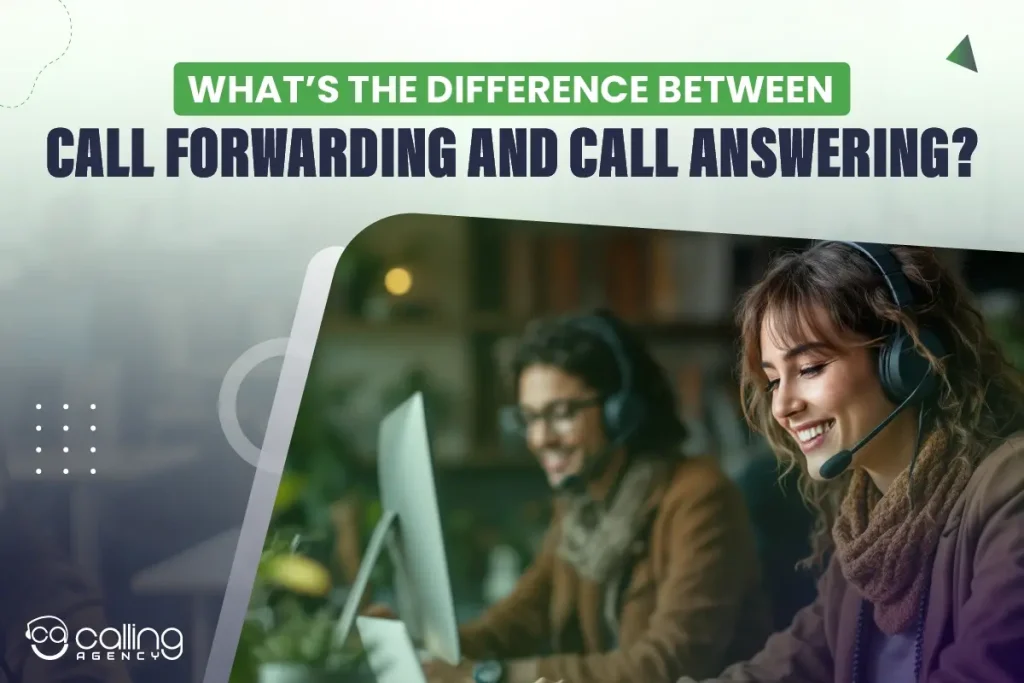Call forwarding and call answering, both are different approaches serving similar purposes. When it comes to boosting operational efficiency, both of these approaches bear the capability to play a significant role.
Despite their similarities in intent and efficiency, the approaches differ slightly. These differences impact the customer experience and overall operations. Therefore, you should figure out which approach will best suit your service.
For that, let’s explore the key differentiating factors of these approaches.
How Do You Define Call Forwarding?
Call forwarding is a handy feature that automatically sends incoming calls to another number. Whether you’re away from your desk, out of the office, or just not available, this tool makes sure that important calls get answered by the right person or team.
Many businesses depend on call forwarding to keep communication flowing smoothly and to avoid missing out on opportunities.
How It Works
The call forwarding feature operates by sending calls to a different phone number when specific conditions are met. It guarantees that calls reach the right person, even if the intended recipient can’t pick up. There are two main types of call forwarding, each designed for different situations:
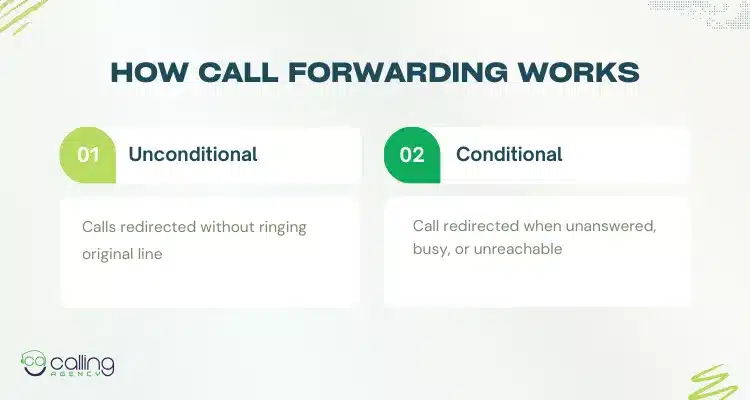
Unconditional Forwarding
This call forwarding type redirects all calls to another number without ringing your original line. It’s perfect for when you’re out of town or want all calls to go to a specific department. This way, no calls go unanswered, which really boosts customer service.
Conditional Forwarding
This conditional forwarding option only forwards calls when certain conditions apply:
- When Busy: If your line is busy, the call gets sent to another number.
- No Answer: If you don’t answer after a set number of rings, the call is forwarded.
- Not Reachable: If your phone is off or out of service, the call gets redirected.
This method is great for managing call flow effectively while ensuring you’re still reachable.
Purpose of Call Forwarding
A lot of businesses utilize call forwarding to keep communication seamless. Here’s why it’s a smart choice:
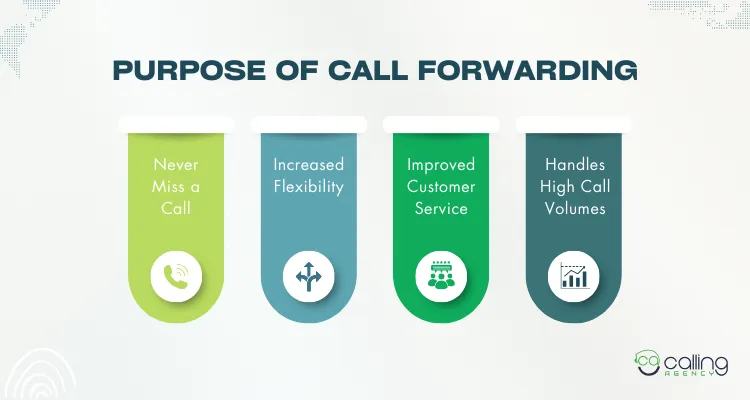
- Never Miss a Call: You can always have calls answered, even if you’re not available.
- Increased Flexibility: Take calls from anywhere, whether you’re at home, on the move, or in a different location.
- Improved Customer Service: Calls are directed to the right person or department for quick resolutions.
- Handles High Call Volumes: It prevents customers from hearing a busy signal, making for a smoother experience.
Call Forwarding: Use Case
Imagine a business owner on the go, attending a conference. To keep things running smoothly, they set up call forwarding to direct all incoming calls straight to their assistant. This way, customer inquiries are still taken care of, even while the owner is out of the office.
How Do You Define Call Answering?
Call answering is a service where a friendly live person, like a virtual receptionist or an assistant, answers calls for you. Instead of just sending calls to voicemail, a trained professional greets the caller, offers help, and either resolves their issue or connects them to the right person.
This service is a great fit for businesses that want to keep a polished image while delivering personalized customer support.
How It Works
When someone dials your business, a call answering service makes sure the phone call is handled with professionalism and efficiency. Here’s how it works:
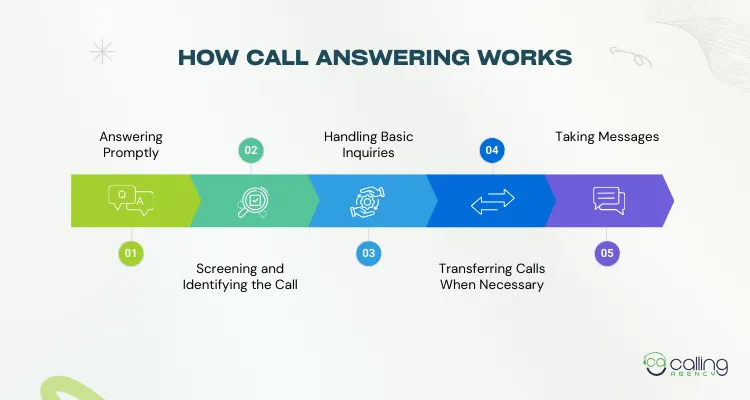
- Answering Promptly: Calls are picked up quickly, so there are no long waits.
- Screening and Identifying the Caller: It figures out who’s calling and why.
- Handling Basic Inquiries: Provides quick answers to common questions, like your business hours or product availability.
- Transferring Calls When Necessary: Routes the call to the right department or team member.
- Taking Messages: If the person the caller wants to reach isn’t available, the service can take detailed messages for later follow-up.
Purpose of Call Answering
Businesses turn to call answering services to add a professional and personal touch. Here are some of the perks:
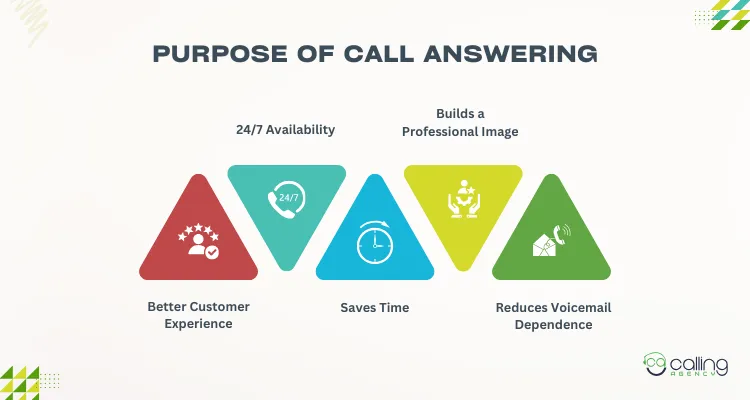
- Better Customer Experience: Callers get to talk to a real person instead of an automated system.
- 24/7 Availability: Some services are available around the clock, keeping your business accessible at all times.
- Saves Time: Your team can concentrate on their work without constant interruptions from calls.
- Builds a Professional Image: A well-run answering service boosts your brand’s credibility.
- Reduces Voicemail Dependence: Ensures customers get real-time help instead of leaving a message.
Call Answering: Use Case
Imagine a busy medical office that relies on a call answering service to manage everything from scheduling appointments to handling prescription refill requests and answering general questions.
This setup lets the medical staff concentrate on what they do best; caring for patients, while making sure that every caller gets the help they need.
What’s the Difference Between Call Forwarding and Call Answering?
Both services help manage business calls, but they function differently. Here’s a side-by-side comparison of their key differences:
| Feature | Call Forwarding | Call Answering |
| Who Handles the Call? | Call is sent to another number automatically. | A live person answers the call. |
| Caller Interaction | The caller speaks to one person after redirection. | The caller may speak to a receptionist before being transferred. |
| Speed | Instant transfer to another number. | Response time depends on how quickly the call is answered and handled. |
| Best For | Ensuring calls reach the right person when unavailable. | Offering a professional touch and handling inquiries before transferring. |
When it comes to deciding between call forwarding and call answering, it really boils down to what your business needs.
Opt for Call Forwarding if you want your calls to be automatically redirected when you’re not available.
On the other hand, go for Call Answering if you prefer having a receptionist or assistant who can manage and screen your calls before passing them on.
For the best of both worlds, consider using both services. This way, you can ensure that every call is managed with professionalism and efficiency.
Final Thoughts
Your business can’t afford to miss important calls, but that doesn’t mean you have to be tied to your phone around the clock.
Call forwarding helps keep everything on track by automatically directing unanswered calls to the right person, while call answering adds that personal touch that makes your business feel more approachable and professional.
Ultimately, it’s not just about managing calls, it’s about taking charge of your customer experience.
Looking for smooth, hassle-free communication? Go for call forwarding. Want to make a great first impression every time? Opt for call answering. Or even better, why not combine both options to ensure that no call and no customer ever falls through the cracks?

